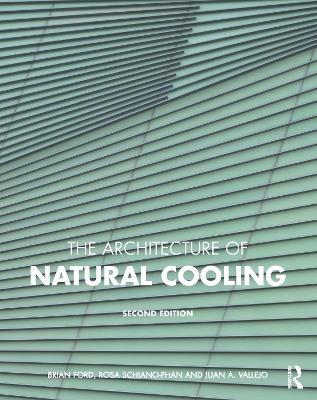
The Architecture of Natural Cooling
Routledge (Verlag)
978-1-138-62905-9 (ISBN)
Overheating in buildings is commonplace. This book describes how we can keep cool without conventional air-conditioning: improving comfort and productivity while reducing energy costs and carbon emissions. It provides architects, engineers and policy makers with a ‘how-to’ guide to the application of natural cooling in new and existing buildings. It demonstrates, through reference to numerous examples, that natural cooling is viable in most climates around the world.
This completely revised and expanded second edition includes:
An overview of natural cooling past and present.
Guidance on the principles and strategies that can be adopted.
A review of the applicability of different strategies.
Explanation of simplified tools for performance assessment.
A review of components and controls.
A detailed evaluation of case studies from the USA, Europe, India and China.
This book is not just for the technical specialist, as it also provides a general grounding in how to avoid or minimise air-conditioning. Importantly, it demonstrates that understanding our environment, rather than fighting it, will help us to live sustainably in our rapidly warming world.
Brian Ford (RIBA FRSA) is an architect, an environmental design consultant and Emeritus Professor at the University of Nottingham. He was in private practice for over 25 years, including Peake Short & Partners and Short Ford Associates, where he has worked on innovative low carbon projects in Europe, USA, India, Australia and China. He initiated a series of multi-partner EU funded research projects on natural ventilation and passive cooling and has served as a member of the UK Government’s Zero Carbon Task Force for Schools, an advisor to Building Green Futures (Bologna, Italy), and was until recently Vice-President of the International PLEA organisation. Rosa Schiano-Phan (BSc DiplArch MSc PhD) is Principal Lecturer in Architecture and Environmental Design at the University of Westminster and co-director of Natural Cooling Ltd. She worked as an architect and environmental design consultant internationally before gaining a PhD at the Architectural Association and becoming a Research Fellow at the University of Nottingham, working on EU research into thermal performance of buildings and passive cooling. She taught at the AA and subsequently moved to the University of Westminster where in 2014 she set up new BSc and MSc courses in Architecture and Environmental Design. Juan A. Vallejo (BSc DiplArch MSc PhD) is Visiting Lecturer in Architecture and Environmental Design (MSc) at the School of Architecture + Cities of the University of Westminster in London (UK) and collaborates with the School of Sustainability (SOS) Team founded by Mario Cucinella Architects in Bologna (Italy). He has worked in Natural Cooling Ltd as an environmental design consultant on projects in the UK and abroad and he is associate of the International Passive Low Energy Architecture (PLEA) organisation. His expertise lies in the field of building environmental simulation software tools, natural ventilation and passive evaporative cooling.
Foreword by Dean Hawkes. 1. Origins and Opportunities. 2. Principles ans Strategies. 3. Climate Applicability Mapping. 4. Integrated Design. 5. Testing the Strategy. 6. Performance Analysis. 7. Component Design. Case Study 1: Torrent Research Centre, Ahmedabad, India. Case Study 2: Centre for Sustainable Energy Technologies, Ningbo, China. Case Study 3: Federal Courthouse, Phoenix, Arizona, USA. Case Study 4: Stock Exchange, Valletta, Malta. Case Study 5: Zion National Park Visitor Centre, Springdale, Utah, USA. Case Study 6: Global Ecology Research Centre, Palo Alto, California, USA. Conclusions. Index
| Erscheinungsdatum | 04.10.2018 |
|---|---|
| Zusatzinfo | 1 Tables, color; 135 Line drawings, color; 22 Line drawings, black and white; 127 Halftones, color; 6 Halftones, black and white; 262 Illustrations, color; 28 Illustrations, black and white |
| Verlagsort | London |
| Sprache | englisch |
| Maße | 219 x 276 mm |
| Gewicht | 453 g |
| Themenwelt | Naturwissenschaften ► Biologie ► Ökologie / Naturschutz |
| Technik ► Architektur | |
| Technik ► Bauwesen | |
| Technik ► Maschinenbau | |
| Technik ► Umwelttechnik / Biotechnologie | |
| ISBN-10 | 1-138-62905-7 / 1138629057 |
| ISBN-13 | 978-1-138-62905-9 / 9781138629059 |
| Zustand | Neuware |
| Informationen gemäß Produktsicherheitsverordnung (GPSR) | |
| Haben Sie eine Frage zum Produkt? |
aus dem Bereich


